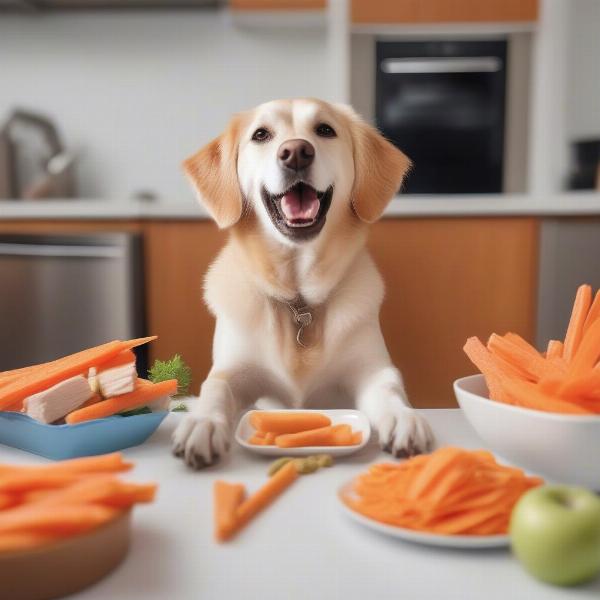Two hands corn dogs in Grand Prairie, Texas, might sound like a delightful treat for you, but can your furry friend join in the fun? While the image of a dog happily munching on a corn dog is appealing, it’s crucial to understand the potential risks involved before offering this snack to your canine companion. This article will explore the safety of corn dogs for dogs, offer healthy alternatives, and provide valuable insights into canine nutrition.
Can Dogs Eat Corn Dogs? Understanding the Risks
While a small bite of a plain corn dog might not be immediately toxic, corn dogs are generally not recommended for dogs. The high fat content, processed meats, and added sugars present in most commercially available corn dogs can contribute to various health issues in dogs, including pancreatitis, obesity, and dental problems. The stick itself also poses a choking hazard.
Healthy Snack Alternatives for Your Canine Friend
Instead of corn dogs, consider these healthier, dog-friendly alternatives:
- Small pieces of cooked, unseasoned chicken or turkey: These provide lean protein without harmful additives.
- Carrot sticks or apple slices: These crunchy treats offer vitamins and fiber.
- Plain, unsweetened yogurt (in moderation): A good source of calcium and probiotics.
- Commercial dog treats: Choose high-quality treats with natural ingredients.
 Dog Enjoying Healthy Treats
Dog Enjoying Healthy Treats
Why Corn Dogs Are a No-Go for Dogs: Ingredient Breakdown
Let’s dissect a typical corn dog to understand why it’s unsuitable for canine consumption:
- Processed meat (hot dog): Often high in sodium, nitrates, and preservatives, all potentially harmful to dogs.
- Cornmeal batter: While corn itself isn’t toxic to dogs, the batter is often deep-fried in unhealthy oils and can be difficult to digest.
- Sugar: Excess sugar can contribute to weight gain, dental problems, and other health issues.
- Stick: A significant choking hazard, especially for smaller dogs.
What to Do If Your Dog Eats a Corn Dog
If your dog snatches a bite of your corn dog, don’t panic. Monitor them closely for any signs of distress, such as vomiting, diarrhea, or lethargy. If you notice any unusual symptoms, contact your veterinarian immediately.
Conclusion
While sharing a corn dog with your furry friend might seem tempting, it’s best to prioritize their health and well-being by offering safe and nutritious alternatives. By understanding the potential risks associated with corn dogs and opting for healthier options, you can ensure your dog enjoys a long and happy life. Remember, a balanced diet and regular veterinary checkups are key to maintaining your dog’s optimal health.
FAQ
- Can a small piece of corn dog kill a dog? While unlikely, the ingredients in a corn dog can cause digestive upset and contribute to long-term health problems.
- What are some signs of pancreatitis in dogs? Vomiting, diarrhea, loss of appetite, lethargy, and abdominal pain.
- Are there any types of corn dogs safe for dogs? No, commercially available corn dogs are generally not safe for dogs.
- What should I do if my dog is choking on a corn dog stick? Seek immediate veterinary attention.
- What are some healthy homemade treats I can make for my dog? There are many recipes online for healthy dog treats using ingredients like peanut butter, bananas, and oats.
- How often should I give my dog treats? Treats should only make up a small percentage of a dog’s daily caloric intake.
- Can I give my dog baby carrots as a treat? Yes, baby carrots are a safe and healthy treat for dogs.
About ILM Dog: ILM Dog is your trusted global resource for all things dog-related. We offer expert advice on Dog Breeds and Selection, Dog Health and Medical Care, Dog Training and Behavior, Dog Nutrition and Feeding, Dog Grooming and Hygiene, and Dog Products and Accessories. Our mission is to provide practical, reliable information to dog owners worldwide, empowering them to provide the best possible care for their canine companions. For expert advice tailored to your dog’s needs, contact us at [email protected] or call us at +44 20-3965-8624.